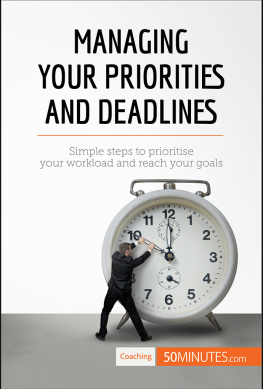Developing the reflexes for success
- Issue: how can I turn my dreams into reality in order to thrive professionally and take control of my own destiny?
- Uses: ambition is a driving force which pushes us to want the best for our future. We just need to know where to start and put a plan of action in place to turn our dreams into reality!
- Professional context: career management, management, career change, starting a business, etc.
- FAQs:
- Does success only depend on the individual?
- How can I surround myself with the right people to increase my chances of success?
- Do you need to trust your instincts in order to succeed?
- Is it possible to be ambitious while respecting the values of altruism, empathy and generosity?
- Does an ambitious person necessarily need to be sure of themselves and free of inhibitions? What knowledge is necessary for success?
- How can I bounce back and succeed after a series of failures in my private or professional life?
- How can women develop their ambition? Isnt ambition primarily a male domain?
- Is it necessary to have a lot of money in order to succeed?
- Can success arrive suddenly, when the person is not expecting it?
- Is there an age limit for professional success?
Success is not the key to happiness. Happiness is the key to success. If you love what you are doing, you will be successful. (Albert Schweitzer, humanist and winner of the Nobel Peace Prize, 1875-1965)
Nowadays, social and professional success are paramount. They are a way of showing who you are to yourself and other people.
In order to make your dreams come true, you can take inspiration from people who have already reached their goals. The media and social networks are brimming with exciting stories from daring people who seem to have it all. For example, there is Olivier who had no qualifications but was able to launch a tech startup which is constantly growing. There are also inspiring stories about career changes: Ccile used to work in advertising and now manages her own restaurant (Les Nouveaux Audacieux, 2015). And of course, we also witness admirable rises within companies, such as a colleague who has climbed the ladder at the company and is now in a senior position.
How did these people go about achieving their goals? What is their secret? Is it luck or destiny? It must quickly be recognised that this is not the case: although luck can be useful, it has little bearing on long-term success. How, then, can you have one of these perfect careers? How can you realise your dreams? How can you bring your ambitions to life and take control of your destiny?
There is an undeniable link between ambition and success. As a general rule, ambition is to do with attitude and is the essential ingredient that leads to success. Nonetheless, success is also a matter of courage and opportunities, or rather the creation of opportunities. It never happens by chance. Although first of all you have to dream it this is where ambition comes in you also have to plan it, develop it and build it. To do this, there are a number of techniques which let you clarify the goals you have set and move towards them step by step.
Furthermore, although you need to put a plan of action in place, you also need to follow your intuition: that little inner voice is often insightful. It talks to us about our deepest aspirations in life and the things that excite our emotions, and refers to our values. Indeed, there is no point setting a fantastic goal for ourselves if it does not match up with who we really are.
If you want to give life to a project, finally realise your dream and accomplish your deepest aspirations, this guide is for you. Thanks to a few useful keys for drawing on your resources, it will help you to see more clearly and formulate strategies to achieve your goals.
Positive ambition: the basics
What is ambition?
In terms of etymology, ambition comes from the Latin word ambitio , which means to go around ( amb : around and ire : to go). According to the Collins English Dictionary, ambition means strong desire for success, achievement, or distinction.
A word with two meanings
Although ambition is widely used in everyday language, it is nonetheless a somewhat ambiguous word which covers several concepts. The term ambition may also have negative connotations because it is sometimes seen as the opposite of humility and modesty. In this usage, ambition is classed as a form of brash arrogance.
In his book LAmbition ou lpope de soi (Ambition or the Epic of I), the French philosopher Vincent Cespedes bases his definition of ambition on the work of the French historian Jules Lacroix de Marls. According to this 19 th -century author, we must differentiate between two kinds of ambition. One is lofty and generous almost to the point of magnanimity, whereas the other is dark, jealous, anxious, vulgar and insensitive to the instruments it uses to achieve its ends. Cespedes concludes that these two types correspond to the two moral poles of good and evil, and asks whether, in our selfish and nihilistic age, it is possible to rediscover positive ambition.
Towards creative ambition
This philosophical and moral perspective is important to better define the framework that this guide fits into. We are focusing on this positive and altruistic form of ambition, which is a force that creates energy and is the driver behind dreams, courage and achievement, and is both personal and collective. The French philosopher Michel Onfray (born in 1959) has also contributed to the rehabilitation of the term. According to him, ambition is the legitimate desire to achieve ones ends in a reality in which the rules are respected (cited in Jacob and Auroux, 1990).
In this guide, you will get to work based on this positive outlook stripped of its flashy, egocentric aspects. Take a big sheet of paper, a pencil, an eraser and some Post-it notes, and make yourself comfortable somewhere nice and calm!
Let yourself dream
This first step involves letting your imagination run free to answer the question: what do you dream of doing in or with your life?
Passion and positivity
Choose a time when you are feeling good to answer this question, because you must think about what you really want. Your answer must not involve thoughtlessly fleeing from your current situation because you no longer want to be part of it. The ability to look to the positive is of central importance here, but will also be crucial throughout the process. Cultivating positive emotions allows you to keep your attention focused on your goal, whereas negative emotions such as anxiety, fear, doubt, guilt, demoralisation and powerlessness will have a paralysing, destructive and energy-sapping effect.
At this stage, the only constraint is that you must think of activities that can make you happy. You absolutely have to like the objectives you set, because this will shape the motivation you need to pursue them. Let yourself dream and get excited!
Harmony and balance
Feel free to draw up columns to distinguish your professional objectives from those that are more personal to you, such as aspects of your personality that you want to develop. Take this opportunity to add more private aspects linked to your family, your partner and your hobbies. Your private and professional life really form one whole, and you must reconcile all these elements to achieve overall harmony.




















